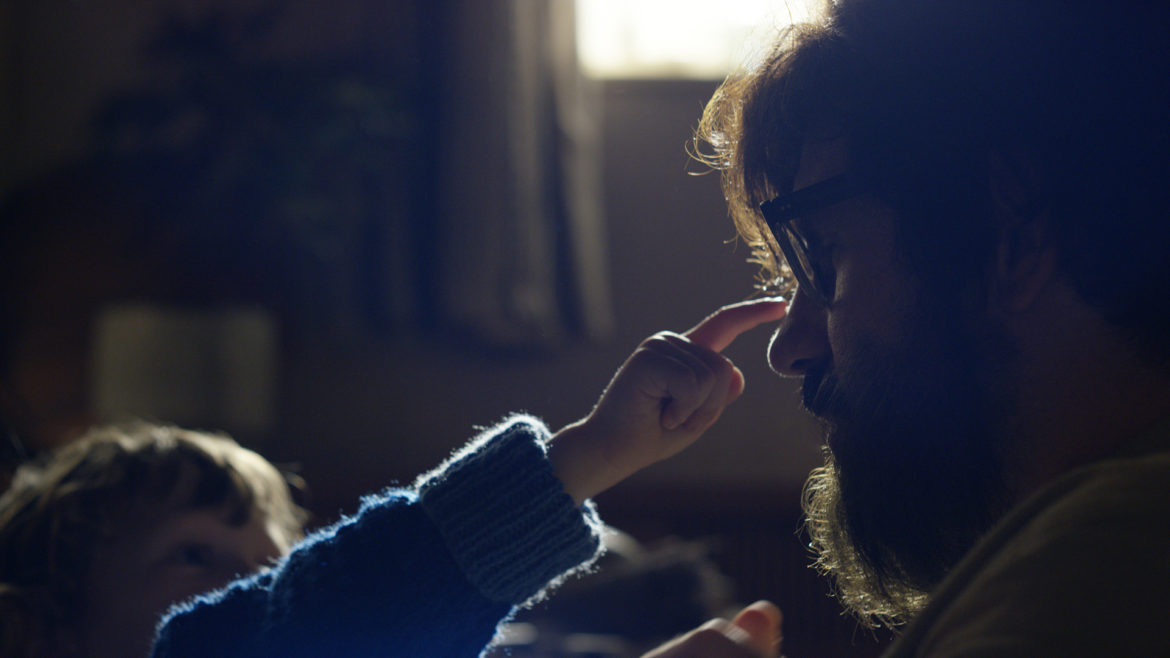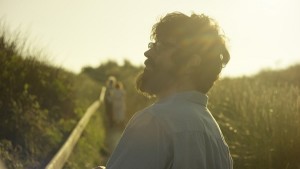From the raw audio material – Hull’s soft, intelligent voice and clearly articulated ideas, the occasional commentary from and conversation with his wife, the heartrending and ghostly appearances of his children on tape – directors Peter Middleton and James Spinney craft in Notes On Blindness a deeply moving portrait of a man grappling with an entirely new way of engaging the world. It’s one that draws on incredible reserves within him, but also one that tests his faith – a particularly acute and painful course to take for a theologian.
How do you make a visual document about the loss of sight? Middleton and Spinney find an ingenious, complex, and emotionally devastating solution. As Hull’s tapes play, actors mouth the words recorded, portraying the events described while the cinematography itself takes on the golden and sepia tones of memory, or the flickering of lights as they fade. Hull’s stand-in (Dan Renton Skinner) is frequently framed low in the shot, dwarfed by the suddenly imposing structures all around.
The central paradox – a cinema of blindness, based entirely on the aural – is always on our minds. The effect is striking and calls to mind Terrence Malick in documentary form, as lush fields and lonely seascapes are conjured while disembodied voices hazily remember things that are already threatening to vanish entirely. It’s a technique that approaches the spiritual, which is entirely appropriate to the topics at hand.
There are numerous moments of heartrending insight and quiet power. Hull relates a conversation he had with his young son inside a tent made of blankets:
“’Will you always be blind?’ he asks me. ‘Yes, I will.’ ‘Why can’t the doctors help you?’ ‘They tried, but sometimes there’s nothing left to try.’ ‘Why can’t God help you?’ ‘He does. He gives me strength and courage.’”
Hull’s daughter suggests that, if she cried directly into his eyes, he would be healed. “I realized,” Hull notes, “this idea came straight from Rapunzel.”
These are moments of high pathos, but most of Hull’s reflections are quieter, spoken in a clipped accent betraying his Australian youth. They are equally sad — a Christmas scene in which Hull struggles to enjoy, for the children’s benefit, the unwrapping of gifts he cannot see — but they also reveal an academic determined to come to grips with the only question that matters: How does one live now? It just so happens that, for Hull, this question has taken on a different sort of urgency and import.
In an incredible and impressionistic touch, the filmmakers gradually emphasize sound design as Hull speaks more and more of the sharpening of other senses. He listens to the rain, and we hear the different cadences of the water and where it falls – it’s a world suddenly made new through differentiated sound … raindrops in puddles, off eaves, patterns ebb and flow. “If only,” he wishes, “it could somehow rain inside the house.” And so it does, on film – the family sits around the kitchen table while unseen skies pour down on them.
The film ends on an appropriately questing note, with more than a little hope from Hull: having given up on a miracle, he decides the new possibilities of a different life are a kind of gift.
In its gentle beauty and sometimes bruising honesty, Notes On Blindness is also a kind of gift to us – an engaged and gorgeous attempt to manifest a world we couldn’t see if we tried.



